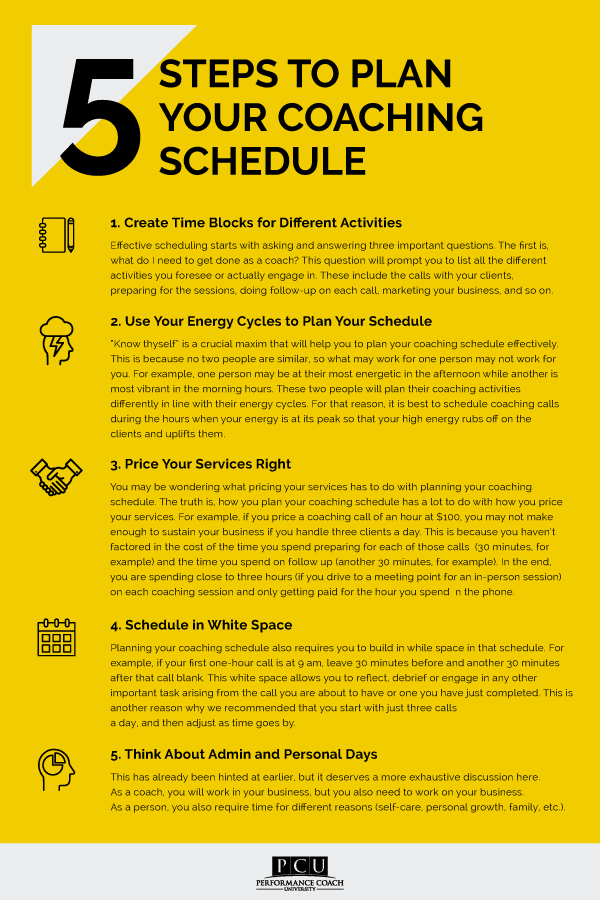You may not have scheduling problems when you first start out as a coach because you will be in the initial stages of building your client list. As time goes by and, hopefully, your business grows, scheduling will start becoming an issue as a result of the different demands being made on your time.
These include the actual coaching calls with your clients and other administrative tasks that go with running a business, not forgetting “me-time.” Here are some tried and tested tips to schedule your coaching business effectively so that you don’t drown in that business.
1. Create Time Blocks for Different Activities
Effective scheduling starts with asking and answering three important questions. The first is, what do I need to get done as a coach? This question will prompt you to list all the different activities you foresee or actually engage in. These include the calls with your clients, preparing for the sessions, doing follow-up on each call, marketing your business, and so on.
The second question is, how long will I need to get each activity done? For example, if your coaching calls last an hour, then you can schedule as many one-hour coaching calls as your day can accommodate. While many coaches handle five coaching calls each day, this may be a bit of a stretch for you as a beginner. It is better to start with three coaching calls a day and adjust based on the results you get.
Follow that same process of determining how much time each of the other activities needs and use this information to answer the third question below.

The third question to help you schedule your coaching business is, when will each of these activities be done? Here, you have to revisit your goals and priorities as you allocate time to different activities.
For instance, would it be prudent for you to constantly disrupt your coaching calls with clients in order to respond to email queries? It is more logical to set aside a time (8 am and 5 pm, for example) when you go through emails and respond to the issues arising. In the same way, plan your day and allocate time blocks to various activities.
2. Use Your Energy Cycles to Plan Your Schedule
“Know thyself” is a crucial maxim that will help you to plan your coaching schedule effectively. This is because no two people are similar, so what may work for one person may not work for you.
For example, one person may be at their most energetic in the afternoon while another is most vibrant in the morning hours. These two people will plan their coaching activities differently in line with their energy cycles.
For that reason, it is best to schedule coaching calls during the hours when your energy is at its peak so that your high energy rubs off on the clients and uplifts them too. If you make the mistake of getting on the phone with a client at a time when your energy is at its lowest, the client will pick up on that low energy and you may not retain him or her for long.
If you are a morning person, schedule client calls in the morning and let the afternoons go to other activities, such as administrative tasks.
3. Price Your Services Right
You may be wondering what pricing your services has to do with planning your coaching schedule. The truth is, how you plan your coaching schedule has a lot to do with how you price your services.
For example, if you price a coaching call of an hour at $100, you may not make enough to sustain your business if you handle three clients a day. This is because you haven’t factored in the cost of the time you spend preparing for each of those calls (30 minutes, for example) and the time you spend on follow up (another 30 minutes, for example). In the end, you are spending close to three hours (if you drive to a meeting point for an in-person session) on each coaching session and only getting paid for the hour you spend on the phone.
Related: Checklist For Setting Up A Successful Coaching Business
What will, therefore, happen in such a scenario is that you will try to cram as many coaching calls into your day as there are clients and the outcome is that the quality of your services will decline (because you aren’t preparing adequately for each coaching call, for example) and other important activities, such as planning for and growing your coaching business to the next level, will fall by the wayside.
The remedy to this lies in thinking carefully about how you price your services. The price has to be just right to enable you to attend to just enough clients for your business to thrive without leaving you overwhelmed and exhausted at the end of each day. Proper pricing also gives you the ability to attend to all aspects of the business, not just being on call with clients.
Right-Click And Save This Infographic

You need to grow yourself as a coach (get new skills, refine your techniques, etc.) since in life, you are either growing or dying. You also need to build your brand as a coaching business and you also need to grow/empower your staff since you cannot succeed on your own. Correct pricing allows you to do all this because you will have fewer but better quality clients to sustain your business.
4. Schedule in White Space
Planning your coaching schedule also requires you to build in while space in that schedule. For example, if your first one-hour call is at 9 am, leave 30 minutes before and another 30 minutes after that call blank. This white space allows you to reflect, debrief or engage in any other important task arising from the call you are about to have or one you have just completed. This is another reason why we recommended that you start with just three calls a day, and then adjust as time goes by.
You also need bigger chunks of while space, such as a two-hour block each day, to handle unforeseen matters arising from the client-end of your business or from the business itself (an issue with an employee, an urgent meeting you need to have to address something that has caught your attention, etc.).
5. Think About Admin and Personal Days
This has already been hinted at earlier, but it deserves a more exhaustive discussion here. As a coach, you will work in your business, but you also need to work on your business. As a person, you also require time for different reasons (self-care, personal growth, family, etc.).
Working in your business refers to attending to the routine demands of your coaching business, such as getting on the phone with your coaching clients, filing your returns, making payroll, and so on.
Working on your business requires a higher level of skills. It includes planning the strategic direction of your coaching business and deciding how to get the business where you want it to be. For example, what do you need to do, be or have in order to move away from clients who pay $100/hr. to clients who gladly pay $500/hr.?
To answer such a question, you have to detach yourself from the daily grind (working in the business) and take an eagle’s view of the big picture.
You also need personal days on which to rest, read a book, attend a course, be with family, or do any other thing that nurtures and nourishes you as a person. This is very important because without such nourishment, your coaching business may stop growing and hit reverse gear.
Earlier on, we suggested that you plan your day in accordance with the ebb and flow of your energy. A further modification of that suggestion could be that you block out entire days, such as Monday, Wednesday and Thursday as days on which you schedule coaching calls. Tuesday and Friday can go to admin and other business-related activities while the weekends are “me-time.”
In this way, you will be fully in charge of your schedule and everything will be catered for without leaving you overwhelmed by the things that require your attention. Remember, nothing is set in stone, so you can keep tweaking your coaching schedule as your needs evolve over time. Have fun with this and share in the comments what has worked for you!
To Your Success,
Jairek Robbins + Team PCU
Ready to level up your coaching and leadership game? Want to make a big impact in the lives of others? Add more power to your purpose with our 12-week online Performance Coach certification course. Apply here: Course overview & Application!
